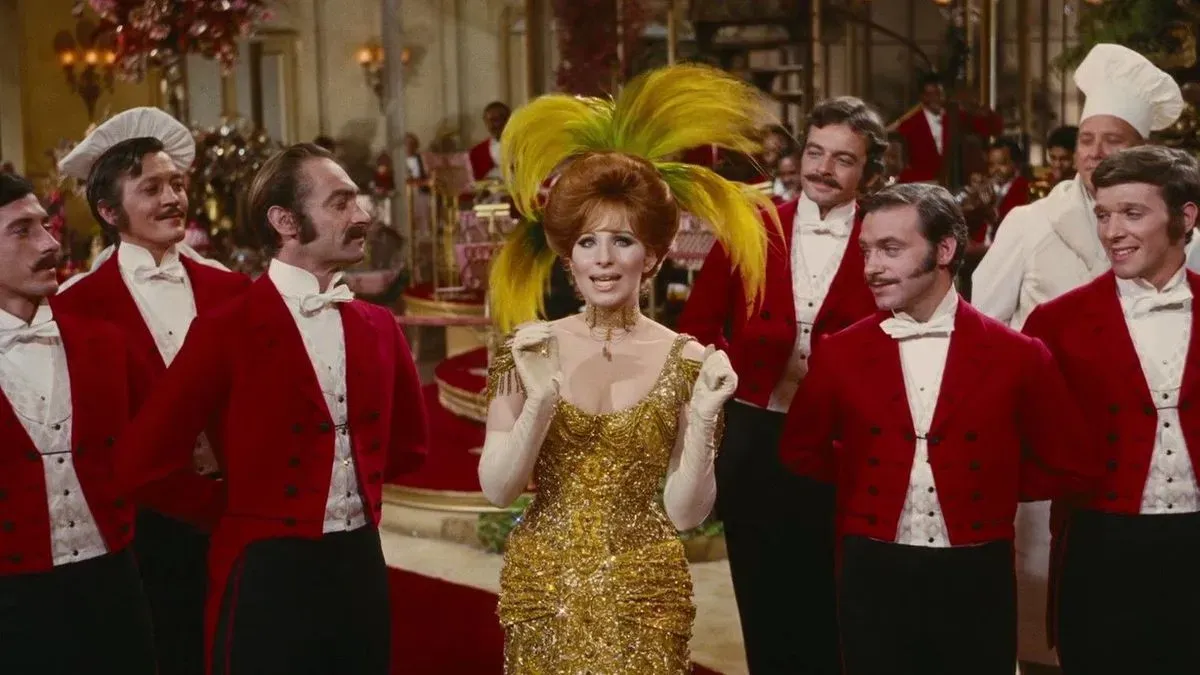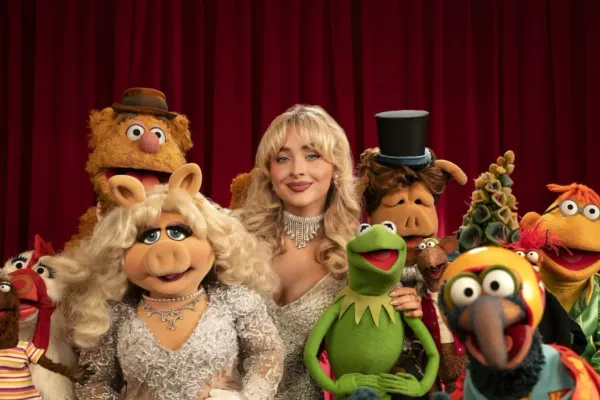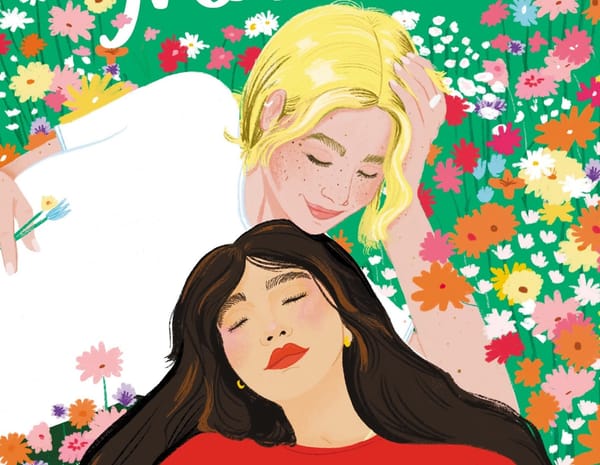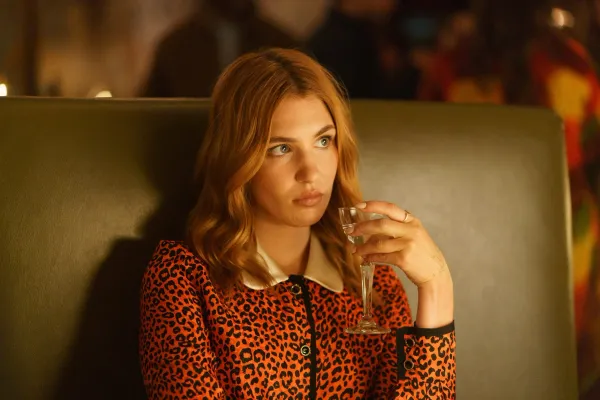The radical leftist, queer utopia of Hello, Dolly!
"Money should circulate like rainwater. It should be flowing down among the people."

(For the month of October, the Wednesday freelance newsletter is moving to Fridays, as I'm taking the month off from recapping. Each week, I’m publishing a new pop culture essay from a freelancer. Remember: Your subscription fee helps me pay these freelancers for their efforts! This week: Teffer Adjemian on the radical leftist, queer utopia suggested by Hello, Dolly!)
This year, desperate to engage with anything that had ever given me comfort, I re-watched the 1969 film version of Hello, Dolly! starring Barbra Streisand as Dolly Levi. I grew up watching the film. I watched it over and over, as it was one of the few VHS tapes in the house. I would hum “Put On Your Sunday Clothes.” I would try to imitate Streisand’s perfect little kick-shuffle when she spits “you dog!” in “So Long, Dearie.”
On my re-watch, I expected to enjoy it, maybe cringe in a few places, and move on. Instead, I was gripped from the beginning. As a kid I had assumed the film was a confusing and not terribly satisfying romance; as a struggling 30-year-old I noticed the threads of class struggle woven throughout the narrative.
Hello, Dolly! follows Dolly Levi, a resourceful widow who maintains a network of side hustles to make ends meet. Dolly is hired by Horace Vandergelder, a wealthy shopkeeper from Yonkers, to take his niece Ermengarde to New York to get her away from her poor artist suitor Ambrose, whom Horace deems unsuitable. Dolly, however, is sympathetic to the young couple and helps them run away together to New York. In the process, Dolly encounters Vandergelder’s two clerks, Barnaby and Cornelius; Irene Molloy, the hatmaker Vandergelder intends to marry; and her assistant Minnie Fay. By the end of the musical, everyone is happily paired off — including Dolly herself — and Horace Vandergelder’s wealth is supporting all of them. At its heart, Hello Dolly is a story of wealth redistribution across class lines, in bustles and fancy hats.
Watching it in 2021, I was also struck by how distinctly, well, queer the whole thing is. Bright young men Barnaby and Cornelius burst out of their cellar-closet and their small town. Cornelius, at “twenty-eight and three-quarters,” has never touched a woman, let alone “kissed a girl.” Irene Molloy, strong, independent, and contentedly single, figures she might as well get married so she can stop “being suspected of being a wicked woman with nothing to show for it.” In The Matchmaker, the Thornton Wilder play on which Hello, Dolly! is based, Irene Molloy is a widow. Hello, Dolly! rewrites her as a spinster and dresses her in the boater and blouse a suffragette might wear. (The film gives Horace Vandergelder a similar treatment, changing him from a widower to a confirmed bachelor.) Yet, somehow, this world full of secluded queer characters finding ways to benefit from heteropatriarchal capitalism isn’t depressing. No, it’s full of revolutionary optimism. And that is the power of Dolly.
Dolly Levi is a self-professed “woman who arranges things,” partly out of personal interest, partly out of financial necessity. She smooths out whatever is in disorder, “like furniture, and daffodils, and lives.” Hello, Dolly! focuses primarily on Dolly’s matchmaking, but her matchmaking is a method to redistribute — rearrange — wealth. Speaking to Vandergelder about his upcoming marriage plans, Dolly frames his marriage as a method of wealth redistribution.
I never did like the idea of all that money of yours lying around in great piles in the bank, so useless and motionless … Money should circulate like rainwater, it should be flowing down among the people, through little dressmakers and cabmen and restaurants, setting up a little business here, furnishing a good time over there, oh I just know that you and the future Mrs. Vandergelder will see that all your hard-earned wealth starts flowing in and around many people’s lives, just flowing, pouring out…
In The Matchmaker, Dolly frames this even more explicitly while speaking to Ambrose, Vandergelder’s would-be nephew-in-law. She supports Ermengarde and Ambrose’s marriage because they are the sort of people who will get Vandergelder’s “idle, frozen money… flowing in and around a lot of people’s lives.” The play, like the musical, is, after all, set at the end of the 19th century, when marriage still operated primarily as an avenue for generational wealth. Particularly for women, the flow of wealth was dictated by marriage. As a poor widow, Dolly Levi understands that better than most. With her husband’s death, she lost not only income, but her entrance into society.
It’s impossible for me to separate Dolly from Streisand’s performance; her barely hidden shoulder slumps, sighs, and grimaces remind us that she is constantly just one step ahead of dropping all the plates. After all, as Irene Molloy establishes, a single woman cannot enter restaurants, concerts, or any other social gathering without a man to preserve her from a reputation as a “wicked woman.” Without that passage into society, Dolly is not only without wealth, but without her means of redistributing it.
Dolly operates by connecting poor, young people without prospects with wealth. Her interest in marrying Horace could be seen as love, and certainly is a means for personal security, but it also frees up Irene to marry Cornelius, who will give her more of the fun she looks for. With Vandergelder supporting Cornelius and Barnaby’s careers, Irene and Minnie’s households, Ambrose and Ermengarde’s home, and Dolly’s livelihood, we see one wealthy man provide security and happiness for seven younger, poorer people. Dolly’s central thesis is that “money… is like manure. It’s not worth a thing unless it’s spread around, encouraging young things to grow,” and her role is to spread that manure as far as she can get it.
This idea of worth surfaces again and again throughout the show. Horace Vandergelder believes “a man ain’t worth a cent until he’s 40”; the worth of youth is to work constantly and amass wealth. Dolly Levi, as established, says money is worthless unless it circulates. In The Matchmaker, Cornelius Hackl says to Barnaby, ““The best of all would be a person who has all the good things a poor person has, and all the good meals a rich person has.” What’s worth more, piles of wealth, or human connection? What is wealth worth, if it doesn’t “furnish a good time”?
And throughout the story, we can tell that the ones who really know — the people who get what money is really worth — are the people who don’t have it. It’s hard not to draw parallels to 2020-2021, when billionaires made $1.8 trillion dollars during the pandemic, while the number of people living in poverty doubled — and the poor rally together to bail each other out while the rich fly to space for fun. Nothing feels quite so current as Dolly quipping “if you have to live from hand to mouth, you better be ambidextrous!” and then passing out business cards to everyone in the train station.
At the center of all of this, we have Horace Vandergelder, upstanding heteropatriarchal capitalist, the half-a-millionaire and self-professed “man of sense” who bumbles about from setting to setting, antagonizing everyone else. Walter Matthau plays Vandergelder as a barreling, uptight man who refuses eye contact, barks his words, and shuts down any attempt at compromise or change. He speaks with unfailing conviction about the way things are. Yet Matthau’s portrayal of Vandergelder is also awkward, gangly. He constantly fails to hide his bafflement when other people don’t share his perspectives.
He pauses at times in the delivery of his lines, seeming almost wistful. This is especially noticeable when Barnaby asks “Why are you getting married?” Pausing, Vandergelder gazes off and says almost to himself, “I’ve worked hard, and I’ve become rich, and friendless, and mean, and in America, that’s about as far as you can go...it’s time to be doing something a little bit foolish” He pauses for a moment, then follows up with, “and besides, I need a good housekeeper!” quickly rousing Cornelius, Barnaby, and a yard full of men into “It Takes a Woman.” But in this number, which Vandergelder is leading, he still looks awkward and uncertain. He dances with a hitch in his gait, and the ensemble around him looks back at him without emotion, even as they all share in their misogynistic bonding ritual praising women as unpaid domestic servants.
Vandergelder’s “frozen money” is a shield, and we finally see his bewilderment complete when Dolly sings “So Long, Dearie,” calling him out on every bit of his charade. “And on those cold winter nights, Horace, you can just cuddle up to your cash register,” she sings, and leaves him standing in the street, speechless, hatless, wearing a boa, with “no niece, no clerks, no friends.” No matter how much Vandergelder blusters, we’re in on the joke. Vandergelder’s toxic masculinity is obviously off mark, and it makes him gullible and vulnerable.
Vandergelder is able to be the butt of the joke because the world of the musical isn’t for men like him. He may have money, and he may have power, but he is an outsider to the people around him. He is surrounded by young people who don’t share his work ethic; instead, they look for human connection.
While it centers on heterosexual marriage, the world of Hello, Dolly! is nonetheless very queer, when we think of queerness as social othering. (It’s worth noting, too, that Thornton Wilder, author of The Matchmaker, was gay.) Whether they’re looking for new models of marriage, like Ambrose and Ermengarde; new kinds of workplaces, like Cornelius; or more social freedom, like Irene, the young people are all plotting against the social order, as represented by Vandergelder.
And Dolly Levi is there, in the center, assuring them all that social connection is worth it. When Ermengarde expresses surprise that Dolly, whom she perceives as “respectable” because of her proximity to Vandergelder, would have “acquaintances” at the Harmonia Gardens, Dolly replies “Not acquaintances, Ermengarde, friends. Dear friends, from days gone by.” She gives the others permission to envision a different future, and, having envisioned it, they make it happen. Ultimately, Vandergelder, the tyrannical symbol of the old order, doesn’t topple or vanish, but is compelled to find his place in the new Yonkers, where money is like manure.
We didn’t learn from Dolly’s lessons when the film first came out, but I take a lot of comfort in the possibilities she presents. How can we build ethical, supportive spaces under capitalism? Maybe by marrying a millionaire and then giving away his wealth — perhaps the 2021 Dolly Levi looks more like MacKenzie Scott. Maybe dismantling wealth inequity can start, not with a Rockefeller, but with a Yonkers storekeeper whose staff refuses to perpetuate the same exploitative capitalist cycle.
Why isn’t this story about inheriting generational wealth more depressing? Because the inheritors don’t simply join the heteropatriarchal capitalist system, they also start working to dismantle it. Maybe, through community care, through alternate visions of workplace, through supporting one another and envisioning a different future — maybe we can get there, too.
Episodes is published three times per week and edited by Emily VanDerWerff. Mondays feature her thoughts on assorted topics. Wednesdays offer pop culture thoughts from freelance writers. Fridays are TV recaps written by Emily. The Wednesday and Friday editions are only available to subscribers. Suggest topics for future installments via email or on Twitter. Read more of Emily's work at Vox.



